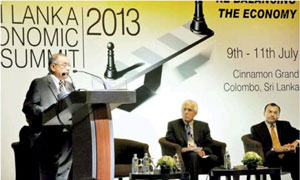Reply To:
Name - Reply Comment
 The International Monetary Fund (IMF) yesterday cautioned the government of the changing debt dynamics, which could have unfavourable repercussions in the years to come and called for immediate fiscal adjustments.
The International Monetary Fund (IMF) yesterday cautioned the government of the changing debt dynamics, which could have unfavourable repercussions in the years to come and called for immediate fiscal adjustments.
According to IMF Resident Representative Dr. Koshy Mathai, today’s favourable debt dynamics with low average interest rates will not last long for Sri Lanka, given its middle income status and the strong financial sector.
“Sri Lanka has for a long time been a low income country and has attracted a lot of concessional debt with low interest rates. But as a middle income country, the majority of the government’s loan portfolio will consist of commercial borrowing. This will push debt servicing costs significantly up,” noted Mathai, projecting more of commercial loans in the debt portfolio going forward.
He made these comments yesterday addressing the first session of Sri Lanka Economic Summit 2013, which is currently being held at Cinnamon Grand Colombo, under the theme ‘Rebalancing the Economy’.
Another reason why the government will have to pay higher interest on its debt, according to Mathai, is the outflow of national savings to more developed financial markets, which are currently being absorbed by the government through Treasury bills and bonds, leaving less money in the system for the government to borrow domestically.
“With the development of the national economy, people will start investing their savings in corporate debt market and equity markets.
They will also invest overseas. Even National Savings Bank and the Employees’ Provident Fund too could invest overseas. Therefore, those savings will no longer go only into government bills and bonds. This will increase the government’s borrowing cost,” he noted.
High fiscal deficits always tend to bring all kinds of economic evils to countries, including higher government debt that should be raised domestically or internationally—of course with consequences.
“So, we are blessed with good circumstances right now. But things may change. It is better to strike now. Let’s do our fiscal adjustments when things are favourable rather than having to do it later when conditions are not so favourable,” Mathai said.
In comparison to emerging markets, Sri Lanka’s debt dynamics have been favourable in the past, despite without much fiscal effort, predominantly due to the concessionary nature of loans the country received, which carry very low interest rates.
Sri Lanka’s debt to GDP gradually declined to 79.1 percent in 2012 from its 102.3 percent in 2005. But according to the IMF, the figure remains still too high.